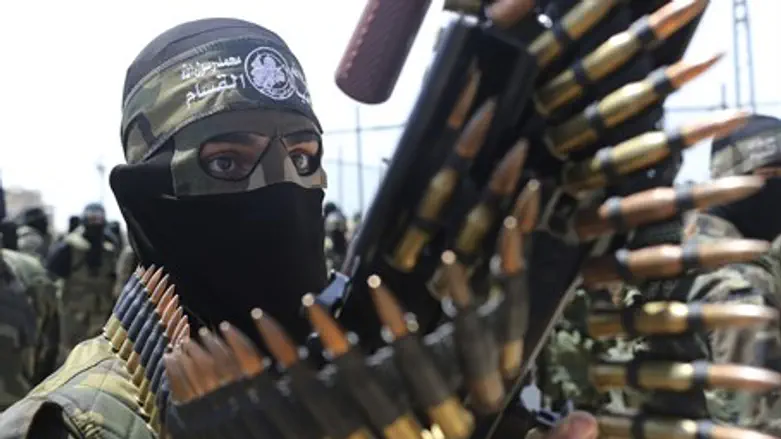
Hamas officials reiterated on Monday that a cease-fire was not on the agenda, unless Israel agreed to major concessions – including several that Israel has in the past said are non-negotiable.
Earlier Monday, Israeli officials said that they were hoping to cause long-term damage to Hamas's military infrastructure before agreeing to ceasefire talks.
Speaking to AFP, Hamas legislative member Mushir al-Masri said that “talk of a ceasefire requires real and serious efforts, which we haven't seen so far. Any ceasefire must be based on the conditions we have outlined, nothing less than that will be accepted.”
Among those conditions: An Israeli lifting of the sea blockade around Gaza, allowing free access to the sea; the reopening of the Rafah crossing into Sinai, which was closed by Egypt; and the re-release of Hamas terrorists arrested in recent weeks as the IDF rounded up suspects who may have been involved in the kidnapping and murder of Israeli teens Eyal Yifrah, Naftali Frenkel, and Gilad Sha'ar.
In Cairo, a Hamas official said a general framework of the Hamas demands had been agreed upon by all factions of the terror group. Hamas, the official said, was determined to achieve more than it did in the truce deal that ended Operation Pillar of Defense. “We need to build on the 2012 truce and move forward. We don't want to go back," he said.
Masri said that "Arab countries and Islamic countries and Western countries" were involved in discussions about a truce, but declined to give details. He said Hamas was prepared to continue fighting and ready for a “long, drawn-out battle.”
Meanwhile, Israeli officials said that Israel had its demands as well, and was unlikely to agree to a cease-fire until they were fulfilled.
Chief among them is a commitment from Hamas, with guarantees, that the terror group will not gear up for another round of attacks next year or the year after. "The Israeli government at this stage is not answering ceasefire efforts because we want to know first that we have taken away Hamas's desire to do this again in another year or six months," Finance Minister Yair Lapid told army radio on Sunday. "That's not happened yet. When it does, then we'll talk."
"The IDF (military) has hit Gaza very hard, but has not hit Hamas's armed wing hard enough," former military intelligence head Amos Yadlin told army radio, saying that so far, only around 50 of the victims were believed to belong to the Islamist movement. Others hit include Islamic Jihad terrorists and a small number of members of other terrorist groups. Several civilians have also been killed as Hamas continues to enlist "human shields" to protect its positions from IAF strikes.
"Things are moving to another stage in which it will try to exact a very high price from Hamas's armed wing and strengthen both our position in the ceasefire negotiations and our deterrence, as well as hitting Hamas's ability to become stronger after the operation," Yadlin added.
Despite the pressure, Hamas has also shown little appetite for a truce, and has rejected ceasefire proposals outright. The Islamist group insists that Israel give in to its conditions for a ceasefire, including a total end to the blockade on Gaza and the release of terrorists arrested in the IDF's ongoing crackdown on Hamas in Judea and Samaria.
